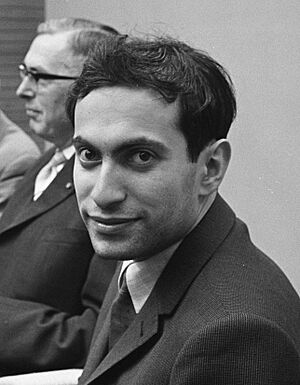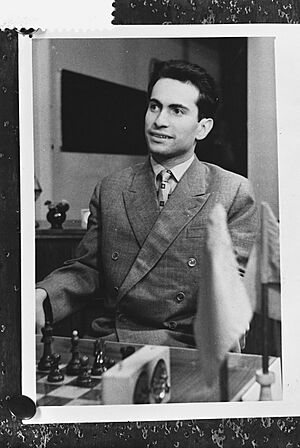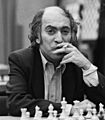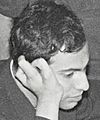Mikhail Tal facts for kids
Quick facts for kids Mikhail Tal |
|
|---|---|

Tal in 1962
|
|
| Full name | Mikhail Nekhemyevich Tal |
| Country |
|
| Born | 9 November 1936 Riga, Latvia |
| Died | June 27, 1992 (aged 55) Moscow, Russia |
| Title | Grandmaster (1957) |
| World Champion | 1960–1961 |
| Peak rating | 2705 (January 1980) |
| Peak ranking | No. 2 (January 1980) |
Mikhail Nekhemyevich Tal (born November 9, 1936 – died June 28, 1992) was a famous chess player from the Soviet Union and Latvia. He became the eighth World Chess Champion. Many people think he was a creative genius and one of the most important players in chess history.
Tal was known for his exciting and daring style of play. He loved to attack and surprise his opponents. His games were full of new ideas and were often hard to predict. People called him "Misha," which is a nickname for Mikhail. He also earned the nickname "The Magician from Riga" because of his amazing chess skills.
Mikhail Tal holds a record for one of the longest times without losing a game in competitive chess. He played 95 games without a loss between 1973 and 1974. This record was only broken much later by Ding Liren. Tal was also a very respected writer about chess.
He passed away in Moscow, Russia, in 1992. Today, a special chess tournament called the Mikhail Tal Memorial is held in Moscow every year to honor him.
Contents
Growing Up and Learning Chess
Tal was born in Riga, which is the capital city of Latvia. He joined a chess club at the Riga Palace of Young Pioneers when he was a child. This is where he started to show his amazing talent.
| a | b | c | d | e | f | g | h | ||
| 8 |

|
8 | |||||||
| 7 | 7 | ||||||||
| 6 | 6 | ||||||||
| 5 | 5 | ||||||||
| 4 | 4 | ||||||||
| 3 | 3 | ||||||||
| 2 | 2 | ||||||||
| 1 | 1 | ||||||||
| a | b | c | d | e | f | g | h | ||
When he was just 13, Tal played against a strong master named Ratmir Kholmov. Tal used a very clever plan to win his game. This showed how creative he was even at a young age.
A chess teacher named Alexander Koblencs started teaching Tal in 1949. After this, Tal's chess skills got much better very quickly. By 1951, he was good enough to play in the Latvian Chess Championship. In 1952, he even finished ahead of his own teacher in the championship!
Tal won his first Latvian chess title in 1953. He then became a Soviet Master in 1954. That same year, he also beat a Grandmaster for the first time. Tal studied Literature at the University of Latvia. He also taught school for a short time when he was in his early twenties.
Becoming a Chess Champion
Tal first became well-known in 1956 at the 1956 USSR Chess Championship. People noticed his exciting and complicated style of play. The next year, when he was only 20, he became the youngest player ever to win the Soviet Championship.
At that time, the Soviet Union had the best chess players in the world. Because Tal won this important championship, FIDE (the world chess organization) gave him the title of Grandmaster. This was a special honor because he had not played in enough international tournaments yet.
Tal played for the Soviet Union in student chess competitions from 1956 to 1958. He helped his team win three gold medals. He also won three gold medals for his individual performance. He won 19 games, drew 8, and lost none.
In 1958, Tal won the Soviet Championship again. He also won a big international tournament called the Interzonal in Portorož. This meant he could compete for the World Chess Championship. He then helped the Soviet Union win its fourth straight Chess Olympiad in Munich.
World Champion Title
Tal won another strong tournament in Zürich in 1959. After that, he played in the Candidates' Tournament in Yugoslavia in 1959. This tournament decided who would challenge the World Champion. Tal played incredibly well and won the tournament. He finished ahead of many strong players, including the young Bobby Fischer. Tal won all four of his games against Fischer in this tournament.
In 1960, when he was 23 years old, Tal played against the World Champion, Mikhail Botvinnik. The match was held in Moscow. Tal won the match with a score of 12½ to 8½. This made him the youngest World Champion ever at that time. Later, Garry Kasparov broke this record.
Botvinnik studied Tal's playing style very carefully. In 1961, Botvinnik played a rematch against Tal and won. Botvinnik changed his strategy to play slower games, which was not Tal's favorite style. Tal also had some health problems with his kidneys, which made it harder for him to play his best.
Tal's time as World Champion was short. He was one of two players who briefly held the title during Botvinnik's long reign.
Later Chess Achievements
After losing the World Championship rematch, Tal continued to be a very strong player. In 1961, he won a big tournament in Bled, even though he lost his individual game against Fischer.
Tal played in six Candidates' Tournaments, but he never again got the chance to play for the World Championship title. He had serious health issues in 1962 and had to leave one tournament early. He recovered after having a kidney removed.
From 1973 to 1974, Tal had another amazing streak of 95 games without a loss. He won 46 of these games and drew 49. This was a record for many years.
Tal played against Anatoly Karpov 22 times. Karpov was World Champion for many of those games. Tal never lost to Karpov in a classical game, drawing 19 of them.
One of Tal's greatest achievements later in his career was sharing first place with Karpov in the 1979 "Tournament of Stars" in Montreal. Tal was the only player in that tournament who did not lose a single game.
Tal won the USSR Chess Championship six times. He also won the International Chess Tournament in Tallinn, Estonia, five times.
Tal was also very good at blitz chess, which is a very fast form of chess. In 1988, when he was 51, he won the official World Blitz Championship. He beat top players like Garry Kasparov and Anatoly Karpov. Just one month before he passed away, Tal even beat Kasparov in a blitz tournament in Moscow.
Playing for Teams
Mikhail Tal was a very important part of the Soviet Union's national chess teams. He played in eight Olympiads, and every time, his team won the gold medal. He won 65 games, drew 34, and only lost two games in Olympiad play. This is one of the best records for any player in the Olympiads. He also won seven individual medals for his performance on his board.
Tal also played for the Soviet Union in six European Team Championships. His team won gold medals every time. He also won three individual gold medals in these events.
He played in two special matches where the Soviet Union team played against a "Rest of the World" team. The Soviet Union won both of these matches.
From 1950 to 1991, Tal won or shared first place in 68 chess tournaments. During his 41-year career, he played about 2,700 games. He won more than 65% of them.
Tal's Unique Chess Style
Tal truly loved the game of chess. He believed that "Chess, first of all, is art." He often played many fast blitz games just for the fun of it, even against less experienced players.
Tal was known as "The Magician from Riga" because of his very aggressive and daring style. He would often give up chess pieces (called a sacrifice) to gain an advantage in the game. He wanted to create exciting attacks that his opponents would find hard to defend against.
Many strong players found it difficult to play against Tal. His style was so intimidating that some players were afraid of being on the losing side of one of his famous, brilliant games. While his sacrifices were powerful, his style was also risky.
As he got older, Tal's style changed a bit. He became more solid and played in a more traditional way. But for many chess fans, his best games were from the time when he combined his youthful imagination with a more solid approach.
Some modern chess players, like Alexei Shirov, are often compared to Tal because they play in a similar exciting way. Tal also taught Shirov when he was young. This has led some people to talk about a "Latvian School of Chess" because many players from Latvia play with a similar attacking style.
Tal did not create many new ideas in the opening moves of chess. However, some openings are named after him, like the Tal Variation in the Caro-Kann Defense. His aggressive use of the Modern Benoni opening also made people look at that opening in a new way.
Famous Games by Tal
- Tal vs. Alexander Tolush, USSR Championship, Moscow 1957: Tal won this game in the last round to become Soviet Champion for the first time.
- Boris Spassky vs. Tal, USSR Championship, Riga 1958: Tal won this complex game to secure his second Soviet title.
- Tal vs. Vasily Smyslov, Yugoslavia Candidates' Tournament 1959: Tal made a daring sacrifice in this game, which won a prize for being a brilliant game.
- Robert James Fischer vs. Tal, Belgrade, Candidates' Tournament 1959: This game shows the interesting tactics from their games during this time.
- Mikhail Botvinnik vs. Tal, World Championship Match, Moscow 1960, 6th game: This is a great example of Tal's attacking style. He sacrificed a knight and won the game.
- Boris Spassky vs. Tal, Tallinn tt 1973: A game full of tactics from the very beginning. Tal attacked the center and then chased the opponent's king.
- Tal vs. Tigran Petrosian, 8th Soviet Team Cup, Moscow 1974: Tal quickly defeated one of the best defensive players of all time in this game.
- Tal vs. Joel Lautier, Barcelona 1992: In his last tournament before he passed away, Tal created one more masterpiece against a younger Grandmaster.
Tal as a Writer
Tal was a very good and respected writer about chess. He wrote several books and was the editor of a Latvian chess magazine called Šahs ("Chess"). His books are famous for how he described his thoughts during his games.
Many people, including other Grandmasters, have said that his book about his World Championship match against Botvinnik is one of the best chess books ever written.
Images for kids
See also
 In Spanish: Mijaíl Tal para niños
In Spanish: Mijaíl Tal para niños
 | George Robert Carruthers |
 | Patricia Bath |
 | Jan Ernst Matzeliger |
 | Alexander Miles |





